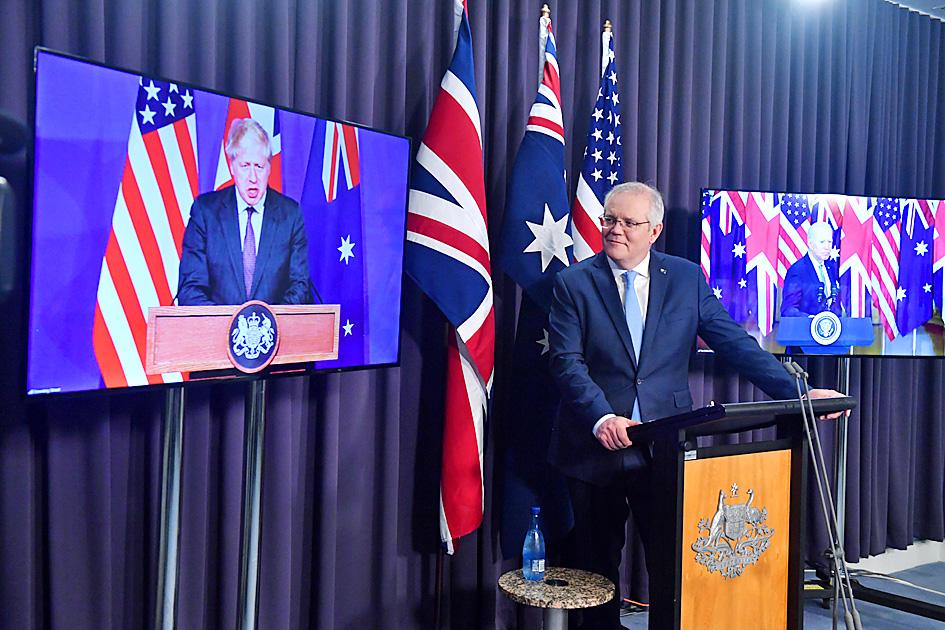The US on Wednesday announced a new alliance with Australia and Britain to strengthen military capabilities in the face of a rising China, with Canberra to receive a nuclear submarine fleet and US cruise missiles.
US President Joe Biden, Australian Prime Minister Scott Morrison and British Prime Minister Boris Johnson did not mention China in unveiling their alliance, dubbed AUKUS — but their intent was clear, and their announcement prompted fury in Beijing.
China yesterday condemned the deal as an “extremely irresponsible” threat to stability in the region.

Photo: EPA-EFE
The agreement also left Paris furious, as Australia scrapped a US$40 billion 2016 deal to purchase conventional submarines from France.
“This initiative is about making sure that each of us has a modern capability — the most modern capabilities we need — to maneuver and defend against rapidly evolving threats,” Biden said, speaking in Washington.
Morrison said that the three all respected “freedom” and “the rule of law,” and that the alliance would help ensure security in the region.
The allies often reference the rule of law and freedoms when railing against China’s military build-up in the South China Sea.
The first major initiative announced under the new alliance was a fleet of eight state-of-the-art nuclear-powered submarines for Australia.
The submarines, said Biden and the other leaders, would not be nuclear-armed, only powered with nuclear reactors.
They would allow Australia’s military to travel, and strike targets, far from its coast.
They “are quieter, faster and have longer endurance, which will allow Australia to deploy its future submarines to Indo-Pacific locations for much longer periods of time,” said Ashley Townshend of the US Studies Centre at the University of Sydney.
In addition to the submarine fleet, a senior Biden administration official said AUKUS would combine forces on “cyber, AI [artificial intelligence] — particularly applied AI — quantum technologies and some undersea capabilities as well.”
Morrison later said that Australia would also acquire long-range US Tomahawk cruise missiles.
A Biden administration official underlined repeatedly how “unique” the decision was, with Britain being the only other state the US has ever helped to build a nuclear fleet.
“This technology is extremely sensitive,” the official said. “We view this as a one-off.”
With China building up its own navy and repeatedly testing decades of US military dominance across Asia, the creation of AUKUS, with its focus on submarines, is “meant to send a message of reassurance and a determination to maintain a strong deterrent stance,” the US official said.
Beijing swiftly condemned the agreement, with Chinese Ministry of Foreign Affairs spokesman Zhao Lijian (趙立堅) saying that it “seriously undermines regional peace and stability and intensifies the arms race.”
The new alliance also torpedoed Australia’s conventional submarine deal with France, which had been personally backed by French President Emmanuel Macron.
French Minister of Europe and Foreign Affairs Jean-Yves Le Drian called the agreement “a stab in the back.”
“I’m very angry today, and bitter... This is not something allies do to each other,” he said.
In the UK, during a Commons debate on the agreement, former British prime minister Theresa May challenged Johnson as to whether the agreement could lead to the UK being dragged into a war with China over Taiwan.
“What are the implications of this pact for the stance that would be taken by the United Kingdom in its response should China attempt to invade Taiwan?” she asked.
In reply, the prime minister was careful not to rule anything out.
“The United Kingdom remains determined to defend international law and that is the strong advice we would give to our friends across the world, and the strong advice that we would give to the government in Beijing,” he said.
The EU was yesterday to set out a formal strategy to boost its presence in the Indo-Pacific region and also counter China’s rising power.
EU High Representative for Foreign Affairs and Security Policy Josep Borrell said the bloc had not been informed about the AUKUS partnership and was trying to find out more.
Additional reporting by Reuters and The Guardian

CHIPMAKING INVESTMENT: J.W. Kuo told legislators that Department of Investment Review approval would be needed were Washington to seek a TSMC board seat Minister of Economic Affairs J.W. Kuo (郭智輝) yesterday said he received information about a possible US government investment in Taiwan Semiconductor Manufacturing Co (TSMC, 台積電) and an assessment of the possible effect on the firm requires further discussion. If the US were to invest in TSMC, the plan would need to be reviewed by the Department of Investment Review, Kuo told reporters ahead of a hearing of the legislature’s Economics Committee. Kuo’s remarks came after US Secretary of Commerce Howard Lutnick on Tuesday said that the US government is looking into the federal government taking equity stakes in computer chip manufacturers that

NORTHERN STRIKE: Taiwanese military personnel have been training ‘in strategic and tactical battle operations’ in Michigan, a former US diplomat said More than 500 Taiwanese troops participated in this year’s Northern Strike military exercise held at Lake Michigan by the US, a Pentagon-run news outlet reported yesterday. The Michigan National Guard-sponsored drill involved 7,500 military personnel from 36 nations and territories around the world, the Stars and Stripes said. This year’s edition of Northern Strike, which concluded on Sunday, simulated a war in the Indo-Pacific region in a departure from its traditional European focus, it said. The change indicated a greater shift in the US armed forces’ attention to a potential conflict in Asia, it added. Citing a briefing by a Michigan National Guard senior

POWER PLANT POLL: The TPP said the number of ‘yes’ votes showed that the energy policy should be corrected, and the KMT said the result was a win for the people’s voice The government does not rule out advanced nuclear energy generation if it meets the government’s three prerequisites, President William Lai (賴清德) said last night after the number of votes in favor of restarting a nuclear power plant outnumbered the “no” votes in a referendum yesterday. The referendum failed to pass, despite getting more “yes” votes, as the Referendum Act (公民投票法) states that the vote would only pass if the votes in favor account for more than one-fourth of the total number of eligible voters and outnumber the opposing votes. Yesterday’s referendum question was: “Do you agree that the Ma-anshan Nuclear Power Plant

ENHANCED SECURITY: A Japanese report said that the MOU is about the sharing of information on foreign nationals entering Japan from Taiwan in the event of an emergency The Ministry of Foreign Affairs yesterday confirmed that Taiwan and Japan had signed an agreement to promote information exchanges and cooperation on border management, although it did not disclose more details on the pact. Ministry spokesman Hsiao Kuang-wei (蕭光偉) said the ministry is happy to see that the two nations continue to enhance cooperation on immigration control, in particular because Taiwan and Japan “share a deep friendship and frequent people-to-people exchanges.” “Last year, more than 7.32 million visits were made between the two countries, making it even more crucial for both sides to work closer on immigration and border control,” he said. Hsiao